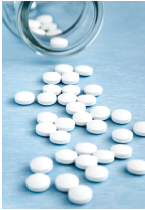Gastrointestinal bleeding is a common side effect of NSAID therapy and limits use in susceptible individuals. Enteric coated formulations or gastroprotection with acid inhibition is often prescribed at therapy initiation; however acid inhibition has its own risk of nutrient malabsorption. This RCT investigated acute gastroduodenal erosion and ulceration following low-dose aspirin and aspirinphosphatidylcholine complex (PL2200) in subjects at risk of aspirin ulcers. Phosphatidylcholine has been previously shown to be of benefit in ulcerative colitis. In this study, upper GI damage of aspirin and PL2200 in healthy subjects (n=204, ages 50-74 years) was compared following 7 days of 325mg once daily, immediate release aspirin or PL2200. Overall, 42.2% of aspirin-treated subjects developed multiple erosions and/or ulcers, whereas 22.2% treated with PL2200 developed such damage (P=0.0027). Gastroduodenal ulcers were observed in 17.6% of aspirin-treated compared with 5.1% of subjects treated with PL2200 (P=0.0069). Low-dose aspirin induced a surprisingly high incidence of acute gastroduodenal ulcers in at risk subjects, highlighting that aspirin’s upper GI risk begins early and may require gastroprotection; aspirin’s preassociation with surface-active phospholipids significantly reduced mucosal damage. PL2200 may be an attractive alternative or complement to proton pump inhibitors in older patients who are at risk of aspirin-induced ulceration. (Am J Gastroenterol. 2011 Feb;106(2):272-7.) PMID: 21081908.









